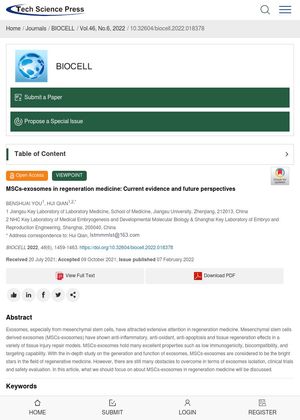TLDR Exosomes from mesenchymal stem cells show promise for tissue repair but face challenges in isolation and safety testing.
The document discusses the role of exosomes, particularly those derived from mesenchymal stem cells (MSCs-exosomes), in regenerative medicine. These MSCs-exosomes have demonstrated anti-inflammatory, anti-oxidant, anti-apoptosis, and tissue regeneration effects in various tissue injury repair models. They possess beneficial properties such as low immunogenicity, biocompatibility, and targeting capability, making them promising in the field of regenerative medicine. However, challenges remain in areas like exosomes isolation, clinical trials, and safety evaluation.
 19 citations
,
June 2021 in “Tissue Engineering and Regenerative Medicine”
19 citations
,
June 2021 in “Tissue Engineering and Regenerative Medicine” Fat stem cell particles help regrow hair.
 8 citations
,
June 2021 in “International Journal of Molecular Sciences”
8 citations
,
June 2021 in “International Journal of Molecular Sciences” Exosomes from umbilical cord cells fix hearing loss and damaged ear hair cells in mice.
 November 2023 in “Klìtinna ta organna transplantologìâ”
November 2023 in “Klìtinna ta organna transplantologìâ” MSC-derived exosomes can help treat COVID-19, hair loss, skin aging, and arthritis.
 25 citations
,
December 2021 in “Stem Cell Research & Therapy”
25 citations
,
December 2021 in “Stem Cell Research & Therapy” MSCs and their exosomes may speed up skin wound healing but need more research for consistent use.
January 2025 in “Cosmetics” Exosomes could improve skin care, but more research is needed to confirm their safety and effectiveness.
 3 citations
,
June 2023 in “MedComm”
3 citations
,
June 2023 in “MedComm” Stem cells and their exosomes show promise for repairing tissues and healing wounds when delivered effectively, but more research is needed on their tracking and optimal use.
 December 2024 in “International Journal of Molecular Sciences”
December 2024 in “International Journal of Molecular Sciences” Human umbilical cord stem cell vesicles may help treat aging and related diseases.






